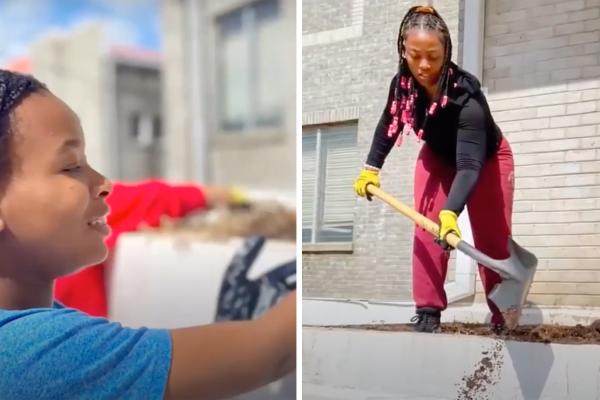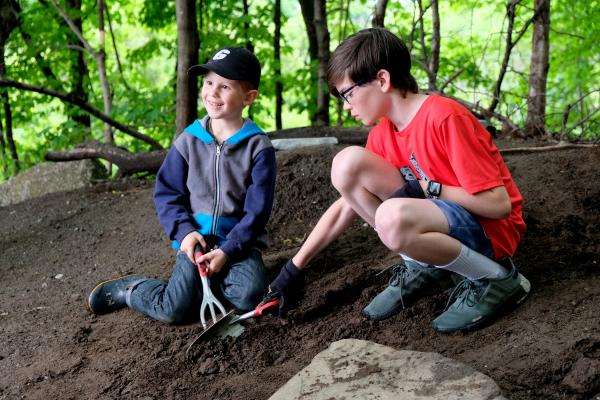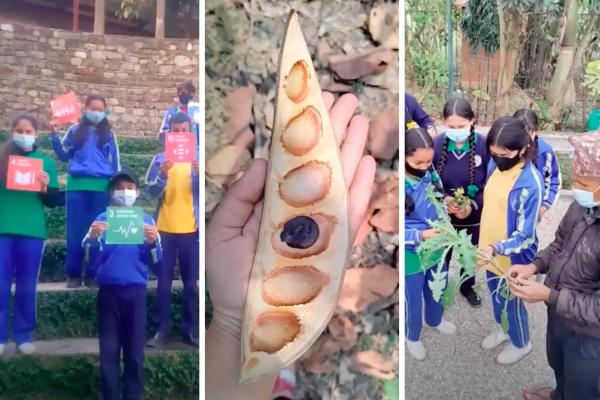Hopeful Stories from Cultivating Pathways to Sustainability
Supporting refugees. Combating climate change. Creating more inclusive communities. Among this year’s Cultivating Pathways to Sustainability projects, you’ll find youth and educators striving to make positive change and address some of our world’s biggest challenges.
In Cultivating Pathways to Sustainability, youth-adult teams develop and implement projects to address the UN’s 17 Sustainable Development Goals in their own communities. The yearlong program pairs these students and educators with coaches from the Shelburne Farms Institute for Sustainable Schools and UP for Learning.
Last month, 2021-22 teams gathered to celebrate the progress they’ve made, and for many, to discuss the changemaking that will continue long after the school year ends. Read on for more about a few of these inspiring projects.
The Piney Woods School, Piney Woods, Mississippi
Project: Campus beautification, including flower plantings. “Piney Woods recently had a setback in faculty and resources due to COVID,” which sparked the idea for a landscaping team, explained Ceasar, a sophomore. Said student Gloria, “Being a part of [Cultivating Pathways to Sustainability] made me feel like I made a difference on our campus.”
How they addressed sustainable development goals: “We managed to help create a sustainable community within our school by adding more plants to the environment; increased life on land by giving animals more room for habitats; and we created a youth-adult partnership with our staff, faculty, and the Mississippi Boy Scouts organization,” said Ceasar. “We wanted to sustain a youth-adult partnership, not only with this beautification, but with other projects as well.”
What they learned: “There were a lot of roadblocks. We combatted that with positivity, by remembering that we were doing this for our community and to build that youth-adult partnership,” said Tayla, a junior. “We still brought community and love to our campus,” said sophomore Arianna. Shared sophomore Savannah, “I feel like I’ve grown leading throughout this work. This work has molded me into a leader.”
Crossett Brook Middle School, Duxbury, Vermont
Project: This sixth-grade team – 33 youth and two teachers – embarked on six different projects, including a bake sale to support refugees coming to Vermont, a school-wide reduction in plastic spoons, and an educational initiative around menstruation called the Period Project.
What the Period Project learned: The team conducted a survey to learn more about student needs and attitudes: Nearly three-quarters of respondents said they would feel more relaxed if they knew there were free products in the bathrooms in case of emergency. Said student Robin on the Period Project team, “Our mission is to get products in the bathrooms at our school, educate future students, and normalize periods.”
On their motivation to make a difference: “Our hope was that at the end of this Period Project, all people who need menstruation products could have equal and fair access,” said student Ella. “That way their families can focus on things like paying rent, health care, food, and education.” The group also created an educational slideshow, which they hope will be shown to students down the road. “I’m proud that we’ll help future generations at Crossett Brook feel more comfortable,” said student Nick.
Georgia Elementary and Middle School, Georgia, Vermont
Project: Launched the first annual school-wide day of service. For their inaugural day of service, the team embarked on two projects: a stream clean-up and the re-establishment of a school garden.
What impact they hope to make: “We hope that more kids take the opportunity to learn outside by the stream,” and that it’s safer to do so, said student Anna. The team will also install signs with QR codes that identify surrounding trees and plants. “With the garden, we hope that school lunches are healthier and fresher. We also want to see that food scraps go into composting in the garden.”
On youth-adult partnership: “I’m proud that you all were open to having challenging conversations and saying what you wanted to be improved,” said GEMS Director of Teaching and Learning Karen Lehning. “The fact that you really want to make your school better, you’ve shown me how important it is to listen to students and use that to make a difference.” Added one student, “At the beginning we were scared to take charge. But we felt more comfortable as time went on. It was cool how students and adults worked as equals. We respected each other as equals.”
Kopila Valley School, Surkhet, Nepal
Project: Interpretive signage for campus trails and local plants.
How they addressed sustainable development: “We didn’t know much about the plants on campus,” shared one student. New signage will help future classes better understand what’s growing there, supporting quality education. Added team coach Jen Cirillo, director of professional learning with Shelburne Farms, identifying the plants will “build a sense of what’s there for fellow students so that they can take better care of it.”
How they tackled this project: There is an incredible array of beautiful plants on Kopila’s campus; there are more than 100 species of trees alone, from mango and papaya to jackfruit. Students interviewed local elders to gather information, building partnerships with the local community along the way. “Every single one of you has made a huge impact on something you care about,” said Sarah Popwicz, UP for Learning program director. “That deserves recognition and applause.”
Cultivating Pathways to Sustainability is a partnership project of Shelburne Farms and UP for Learning. Thank you to all of this year’s participating teams: Crossett Brook Middle School (Duxbury, VT); Georgia Elementary and Middle School (VT); Harwood Union Middle and High School (Moretown, VT); Kopila Valley School (Surket, Nepal); Main Street Middle School (Montpelier, VT); and The Piney Woods School (Piney Woods, Mississippi).
Join us! We’re now accepting applications for 2022-23 Cultivating Pathways to Sustainability.



